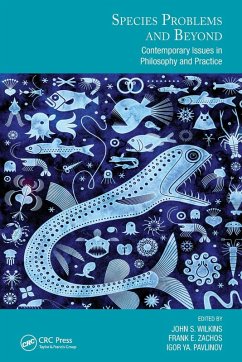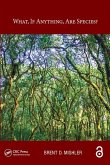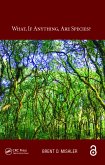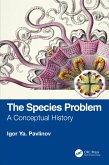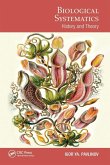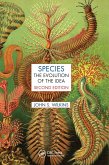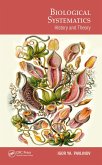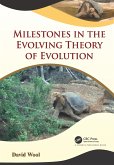Species Problems and Beyond offers a collection of up-to-date essays discussing from an interdisciplinary perspective the many ramifications of the 'Species Problem.' The authors represent experts in the philosophy of biology, in species-level evolutionary investigations, and in biodiversity studies and conservation. Some of the topics addressed concern the context sensitivity of the term 'species'; species as individuals, processes, natural kinds, or as 'operative concepts'; species delimitation in the age of Big (genomic) Data; and taxonomic inflation and its consequences for conservation strategies. The carefully edited volume will be an invaluable resource for philosophers of biology and evolutionary biologists alike.
- Olivier Rieppel, Rowe Family Curator of Evolutionary Biology, Negaunee Integrative Research Center, Field Museum, USA
Species, or 'the Species Problem', is a topic in science, in the philosophy of science, and in general philosophy. In fact,it encompasses many aspects of the same problem, and these are dealt with in this volume. Species are often thought of as fundamental units of biological matter to be used in ecology, conservation, classification, and biodiversity. The chapters in this book present opposing views on the current philosophical and conceptual issues of the Species Problem in biology.
Divided into four sections, Concepts and Theories, Practice and Methods, Ranks and Trees and Names, and Metaphysics and Epistemologies, the book is authored by biologists, philosophers, and historians, many leaders in their fields. Topics include ontology of species, definitions of both species category and units, species rank, speciation issues, nomenclature, ecology, and species conservation.
Species Problems and Beyond aims to clarify the contemporary issues of the Species Problem. It is ideal for use in upper-level seminars and courses in Evolutionary Biology, Philosophy of Science, Philosophy of Biology, Systematics and Taxonomy, and Phylogenetics/Cladistics, and for any scholar in these fields.
- Olivier Rieppel, Rowe Family Curator of Evolutionary Biology, Negaunee Integrative Research Center, Field Museum, USA
Species, or 'the Species Problem', is a topic in science, in the philosophy of science, and in general philosophy. In fact,it encompasses many aspects of the same problem, and these are dealt with in this volume. Species are often thought of as fundamental units of biological matter to be used in ecology, conservation, classification, and biodiversity. The chapters in this book present opposing views on the current philosophical and conceptual issues of the Species Problem in biology.
Divided into four sections, Concepts and Theories, Practice and Methods, Ranks and Trees and Names, and Metaphysics and Epistemologies, the book is authored by biologists, philosophers, and historians, many leaders in their fields. Topics include ontology of species, definitions of both species category and units, species rank, speciation issues, nomenclature, ecology, and species conservation.
Species Problems and Beyond aims to clarify the contemporary issues of the Species Problem. It is ideal for use in upper-level seminars and courses in Evolutionary Biology, Philosophy of Science, Philosophy of Biology, Systematics and Taxonomy, and Phylogenetics/Cladistics, and for any scholar in these fields.
Species Problems and Beyond offers a collection of up-to-date essays discussing from an interdisciplinary perspective the many ramifications of the 'Species Problem.' The authors represent experts in the philosophy of biology, in species-level evolutionary investigations, and in biodiversity studies and conservation. Some of the topics addressed concern the context sensitivity of the term 'species'; species as individuals, processes, natural kinds, or as 'operative concepts'; species delimitation in the age of Big (genomic) Data; and taxonomic inflation and its consequences for conservation strategies. The carefully edited volume will be an invaluable resource for philosophers of biology and evolutionary biologists alike.
-- Olivier Rieppel, Rowe Family Curator of Evolutionary Biology, Negaunee Integrative Research Center, Field Museum, USA
The idea of species, and the things in nature we call species, are foundational concepts in ecology and evolutionary biology, and central to our understanding of the natural world and how it is organized. This book brings philosophers and biologists together to drill down on the nature of species. It demonstrates that the problem of species, and its role in biological theory and practice, is more complex than most biologists realize, and it also highlights the spectrum of insights, and differences, that philosophers bring to this problem. It articulates new perspectives for both disciplines.
-- Joel Cracraft, Lamont Curator and Curator-in-Charge, Department of Ornithology, American Museum of Natural History, USA
Just when we thought there was noting more to say about 'the species problem,' this volume presents us with new approaches and reopens old debates in fruitful ways. By broadening the context to 'species problems and beyond,' the diverse contributions in this edited collection allows philosophers to reconsider classic debates and concepts in this domain but also provides perspectives on parallel debates within biological practices as well as critical historical reflections. This may be the volume that helps even those of us who tend to (productively) dislike these debates to grapple anew with species problems.
-- Rachel A. Ankeny, Professor, School of Humanities, The University of Adelaide, Australia
What is the species problem? Is it one problem, or several? Has it been solved, or, are we just getting started? If these questions are of interest to you, this is a fantastic place to start. The volume is composed of essays by scholars at the leading edge of their field. The authors are - by and large - philosophers of science, but it is a book that should be of interest to both philosophers and biologists. The "species problem" as it's become known, is actually several problems, and the editors and authors deftly parse these problems, setting out competing solutions, and offering novel perspectives, and considering wider implications, such as concerning conservation. I highly recommend the volume to faculty, graduate students, and scholars with interests in species, conservation, metaphysics, and conceptual change in science, more generally.
-- Anya Plutynski, Washington University in St. Louis, US
-- Olivier Rieppel, Rowe Family Curator of Evolutionary Biology, Negaunee Integrative Research Center, Field Museum, USA
The idea of species, and the things in nature we call species, are foundational concepts in ecology and evolutionary biology, and central to our understanding of the natural world and how it is organized. This book brings philosophers and biologists together to drill down on the nature of species. It demonstrates that the problem of species, and its role in biological theory and practice, is more complex than most biologists realize, and it also highlights the spectrum of insights, and differences, that philosophers bring to this problem. It articulates new perspectives for both disciplines.
-- Joel Cracraft, Lamont Curator and Curator-in-Charge, Department of Ornithology, American Museum of Natural History, USA
Just when we thought there was noting more to say about 'the species problem,' this volume presents us with new approaches and reopens old debates in fruitful ways. By broadening the context to 'species problems and beyond,' the diverse contributions in this edited collection allows philosophers to reconsider classic debates and concepts in this domain but also provides perspectives on parallel debates within biological practices as well as critical historical reflections. This may be the volume that helps even those of us who tend to (productively) dislike these debates to grapple anew with species problems.
-- Rachel A. Ankeny, Professor, School of Humanities, The University of Adelaide, Australia
What is the species problem? Is it one problem, or several? Has it been solved, or, are we just getting started? If these questions are of interest to you, this is a fantastic place to start. The volume is composed of essays by scholars at the leading edge of their field. The authors are - by and large - philosophers of science, but it is a book that should be of interest to both philosophers and biologists. The "species problem" as it's become known, is actually several problems, and the editors and authors deftly parse these problems, setting out competing solutions, and offering novel perspectives, and considering wider implications, such as concerning conservation. I highly recommend the volume to faculty, graduate students, and scholars with interests in species, conservation, metaphysics, and conceptual change in science, more generally.
-- Anya Plutynski, Washington University in St. Louis, US

